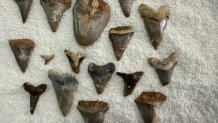
A Florida family made the find of a lifetime when they unearthed a 6.5-inch megalodon tooth near Charleston, South Carolina, earlier this month.
Paul Columbia and his family of four from Largo, Florida, found the tooth during a fossil hunting expedition with Palmetto Fossil Excursions.
"Can you say MONSTER?!?!" the tour group said in a Facebook post on June 10.
Get top local stories in Southern California delivered to you every morning. >Sign up for NBC LA's News Headlines newsletter.
The family had been driving to Tennessee for their son's baseball tournament, according to USA Today, when they decided to stop by South Carolina to hunt for fossils. Little did they know they would discover a tooth belonging to a former apex predator.
The fossil came from a shark about 60 to 65 feet long, Palmetto Fossil Excursions co-owner Skye Basak said.
"I think it was an incredible find," she said. "You're lucky to find a 6-inch [tooth]. You're aiming for a unicorn to find the 6.5-inch."
U.S. & World
News from around the country and around the globe
Megalodon teeth found on land are typically between 2 to 4 inches long, according to Basak. While it is common for divers find larger teeth in the water, she said land site hunters are lucky to find even one tooth of the size the Columbia family found in their lifetimes.
Basak herself found a 7.17-inch megalodon tooth in September 2023, which she said is "literally a unicorn."
"There’s just something about digging through the layers of earth in search of pieces of history that nobody else has ever seen before," she added. "That's a pretty incredible feeling to be slicing through the dirt and suddenly, your shovel meets the blade of something that lived in the ocean three million years ago."
In addition to the megalodon tooth, the family found 30 more teeth belonging to mako sharks and direct megalodon ancestor Otodus angustidens.

The megalodon is the largest shark to have ever roamed the ocean, and its very name means "large tooth," according to the National History Museum. The species went extinct about 3.6 million years ago.
“We could not believe the size, the color or our luck,” Columbia said to the media. “What started as a baseball tournament trip became an experience of a lifetime.”



